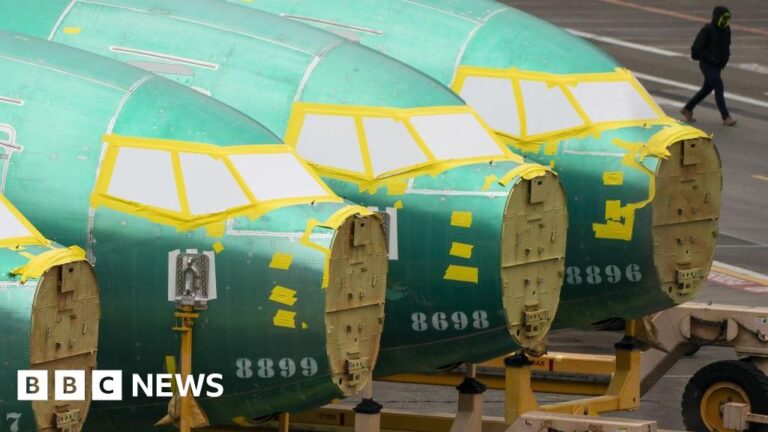Getty Images
Struggling aerospace giant Boeing says it delivered just 348 planes to customers last year, its lowest output since the pandemic.
Boeing ended the year with a backlog of 5,595 unfilled orders.
Stricter scrutiny of the aircraft maker’s practices as well as industrial action have hampered production at what is one of the largest U.S. manufacturers.
On the other hand, its main European rival Airbus supplied 766 planes.
Boeing’s production was crippled in 2024, initially due to serious concerns about quality control, both at its own facilities and at a key supplier.
Later that year, a workers’ strike in the heart of Washington state paralyzed two of its most important factories.
Together, these factors have contributed to its production falling from the 528 aircraft delivered in 2023.
Boeing’s year got off to a bad start. In January 2024, a sign installed on an unused emergency exit door fell from a brand new 737 Max shortly after takeoff.
The incident left a gaping hole in the side of the plane. Investigators later concluded that the sign had not been properly secured.
The case has put the quality control standards of Boeing and its main supplier Spirit Aerosystems under the spotlight.
An audit by the US regulator, the Federal Aviation Administration, found “several instances” in which the two companies had failed to meet required standards.
Boeing previously planned to ramp up production of the 737 Max, its best-selling plane. Instead, its production was capped by the FAA.
The company has also faced heavy public criticism over its apparent failure to improve safety standards following two previous accidents involving the 737 Max five years ago.
The manufacturer has since faced increased scrutiny from the regulator and is in the process of implementing a major plan to improve safety and quality control.
While dealing with the aftermath of the January incident, Boeing was also facing supply chain issues.
These have affected the entire sector since the Covid pandemic. The shortage of parts, particularly engines, has slowed production of the 787 Dreamliner and 777 Freighter.
In September, Boeing suffered another blow when more than 33,000 workers in the northwest United States went on strike.
The dispute, which centered on wages and pensions, was the first major walkout at the company since 2008.
It halted work at major Boeing factories in the Seattle area, crippling production of the 737, 777 and 767 cargo planes.
The strike ended in early November, but disruptions continued for several weeks. The 737 Max production line only restarted in mid-December.
Boeing’s problems, which have cost the company billions of dollars, have also created headaches for airlines.
The company’s backlog of unfulfilled orders…. . But even before last year’s events, she was having trouble building them quickly enough.
The 528 planes delivered in 2023 are far from reaching the pre-Covid record of 806, set in 2018.
Airbus is in a much healthier position, but still fell short of its production targets last year as it struggled with its own supply chain issues. Its order book now stands at more than 8,600.
With Airbus unable to make up for Boeing’s deficit, airlines are struggling to get the planes they want.
In November, Ryanair chief executive Michael O’Leary described delays in getting new planes as “a pain in the butt”.
The airline has repeatedly warned that the lack of planes will affect its growth plans and limit the number of passengers it can carry this summer.

